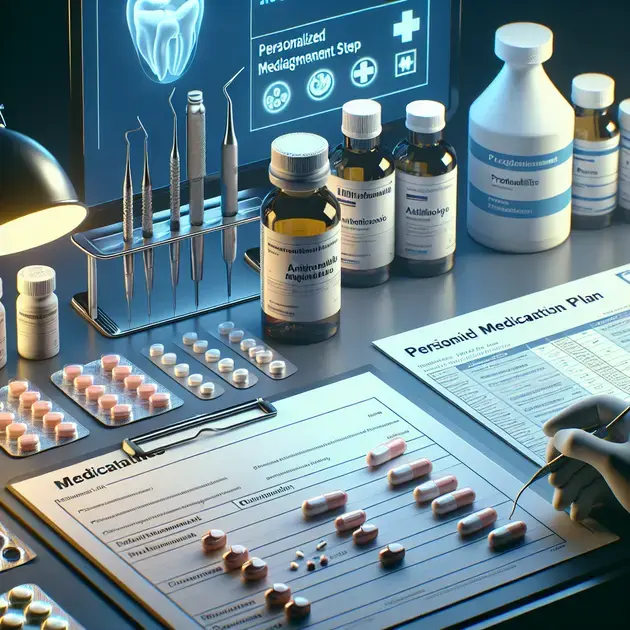When it comes to treating periodontitis, it’s crucial to explore the top medication options available. Periodontitis is a serious gum infection that damages the soft tissue and destroys the bone that supports your teeth.
Fortunately, advancements in dental care have led to several effective medications specifically designed to target and combat periodontitis. In this post, we will discuss some of the top medication options for periodontitis treatment that can help you regain your oral health and prevent further complications.

Understanding the Role of Medications in Periodontitis Management
Periodontitis, a severe form of gum disease, requires a comprehensive treatment plan that may include medications to effectively manage the condition. Understanding the role of medications in periodontitis management is crucial for successful treatment outcomes. Medications can help control bacterial growth, reduce inflammation, and promote healing in the gums.
One key aspect of managing periodontitis with medications is the use of antimicrobial agents. These medications, such as chlorhexidine mouthwash, can help reduce the levels of harmful bacteria in the mouth and prevent further progression of the disease. Patients can obtain detailed information about recommended antimicrobial agents from reputable dental websites such as the American Dental Association (ADA) website.
In addition to antimicrobial agents, anti-inflammatory medications play a vital role in periodontitis management. Nonsteroidal anti-inflammatory drugs (NSAIDs) can help reduce gum inflammation and discomfort. Patients can consult with their dentists or periodontists to determine the most appropriate anti-inflammatory medications for their specific condition.
Furthermore, medications that promote gum healing and tissue regeneration are commonly used in periodontitis treatment. Prescription-strength mouthwashes containing fluoride or other remineralizing agents can support gum health and aid in the repair of damaged tissues. Patients can access detailed information about these medications from trusted medical websites such as WebMD.
In conclusion, understanding the role of medications in periodontitis management is essential for developing an effective treatment plan. By utilizing antimicrobial agents, anti-inflammatory medications, and healing-promoting medications, patients can effectively manage their periodontal condition and improve their oral health.
Key Medications for Effective Periodontitis Treatment
Chlorhexidine Mouthwash
Chlorhexidine mouthwash is a key medication for effective periodontitis treatment. This antimicrobial agent can help reduce bacterial growth in the mouth and control the progression of gum disease. Patients can purchase chlorhexidine mouthwash over the counter at most pharmacies or obtain a prescription for a stronger formulation from their dentist.
Nonsteroidal Anti-Inflammatory Drugs (NSAIDs)
NSAIDs play a crucial role in managing gum inflammation and discomfort associated with periodontitis. Common NSAIDs such as ibuprofen can help reduce pain and swelling in the gums. Patients should follow the recommended dosage instructions and consult with their healthcare provider if they have any concerns about NSAID use.
Prescription-Strength Mouthwashes with Fluoride
Prescription-strength mouthwashes containing fluoride are beneficial for promoting gum healing and tissue regeneration in periodontitis patients. These mouthwashes can help strengthen tooth enamel, reduce sensitivity, and support overall oral health. Patients can ask their dentist for recommendations on specific fluoride mouthwash products.
Topical Antibiotics
Topical antibiotics, such as minocycline microspheres, are commonly used in periodontitis treatment to target specific areas of gum infection. These medications are applied directly to the gum pockets during dental procedures to help control bacterial growth and promote healing. Patients should follow their dentist’s instructions on how to use topical antibiotics properly.
Oral Bone-Enhancing Medications
For severe cases of periodontitis that have resulted in bone loss, oral bone-enhancing medications may be prescribed to stimulate bone growth and regeneration. These medications can help restore the supporting structures of the teeth and improve overall dental health. Patients should discuss the potential benefits and risks of oral bone-enhancing medications with their periodontist.

Understanding the Role of Medications in Periodontitis Management
Periodontitis is a chronic inflammatory condition that affects the gums and other supporting structures of the teeth. The management of periodontitis often involves a combination of professional dental treatments and at-home care. Medications can play a crucial role in controlling the progression of periodontitis and supporting overall oral health.
One key medication used in the treatment of periodontitis is antibiotics. Antibiotics may be prescribed to control bacterial infections that contribute to gum disease. These medications can help reduce inflammation, fight infection, and promote healing in the gums.
Another important type of medication for periodontitis management is antimicrobial mouth rinses. These rinses contain active ingredients that help reduce the levels of harmful bacteria in the mouth. By using antimicrobial mouth rinses as directed, patients can complement their daily oral hygiene routine and improve the health of their gums.
In some cases, anti-inflammatory medications may be recommended to help reduce swelling and pain associated with periodontitis. These medications can help manage discomfort and support the healing process in the gums.
Overall, medications play a significant role in the comprehensive treatment plan for periodontitis. By working closely with your dental care team and following their recommendations for medication use, you can effectively manage the condition and promote long-term oral health.
Key Medications for Effective Periodontitis Treatment
When it comes to treating periodontitis, several key medications can support the management of the condition. One essential medication is chlorhexidine mouthwash, which is an antimicrobial rinse commonly used to control plaque and gingivitis. By incorporating chlorhexidine mouthwash into your daily oral hygiene routine, you can help reduce bacteria levels in the mouth and support gum health.
Another important medication for periodontitis treatment is doxycycline. This antibiotic medication is used to target specific bacteria associated with gum disease and help reduce inflammation in the gums. Doxycycline can be prescribed in the form of a gel that is applied directly to the affected areas, providing targeted treatment for periodontitis.
In some cases, your dentist may recommend the use of locally applied antimicrobials, such as minocycline microspheres. These microspheres release medication over time and can help reduce pocket depth in the gums, promoting better periodontal health.
For more severe cases of periodontitis, systemic antibiotics may be prescribed to target bacterial infections throughout the body. These medications can be an essential part of the treatment plan for advanced gum disease and may be used in combination with other therapies to achieve optimal outcomes.
By working with your dental care team to determine the most appropriate medications for your individual needs, you can effectively manage periodontitis and maintain a healthy smile for years to come.
Guidelines for Personalizing Your Periodontitis Medication Plan
Personalizing your medication plan for periodontitis involves working closely with your dentist to determine the most effective treatments for your specific condition. One important guideline is to communicate openly with your dental care team about any medications you are currently taking, as certain medications can interact with those used to treat periodontitis.
It is also essential to follow your dentist’s instructions for medication use carefully. This includes taking medications as prescribed, adhering to recommended dosages, and completing the full course of treatment. Consistency is key in achieving successful outcomes with periodontitis medications.
Regular dental visits are crucial for monitoring the effectiveness of your medication plan and making any necessary adjustments. Your dentist will evaluate your progress, assess the health of your gums, and recommend any changes to your treatment as needed.
In addition to medications, maintaining a thorough oral hygiene routine is essential for managing periodontitis. Brushing twice a day, flossing daily, and using antimicrobial mouth rinses as recommended can help control plaque buildup and reduce the risk of gum disease progression.
By following these guidelines, staying proactive about your oral health, and working closely with your dental care team, you can personalize a medication plan that effectively manages periodontitis and supports long-term gum health.
Conclusion
In conclusion, understanding the role of medications in periodontitis management is essential for maintaining oral health. Medications, including antibiotics, antimicrobial mouth rinses, and anti-inflammatory drugs, play a crucial part in controlling bacterial infections, reducing inflammation, and promoting healing in the gums. Incorporating key medications like chlorhexidine mouthwash, doxycycline, and locally applied antimicrobials into the treatment plan can effectively support the management of periodontitis.
Personalizing a medication plan with the guidance of dental care professionals is vital for tailored treatment. Communication with the dental team, following prescribed instructions diligently, and attending regular dental visits are crucial steps in achieving successful outcomes with periodontitis medications. Consistency in medication use, along with maintaining a thorough oral hygiene routine, is key to managing the condition and preventing gum disease progression.
By working closely with dentists, patients can determine the most appropriate medications for their individual needs, ensuring effective periodontitis management for long-term gum health. Overall, a comprehensive approach that includes medications, proper oral hygiene, and regular dental care is essential in combating periodontitis and promoting a healthy smile for years to come.



